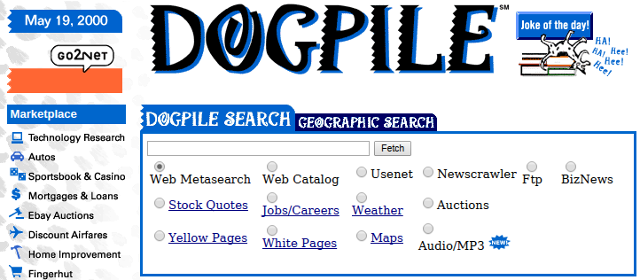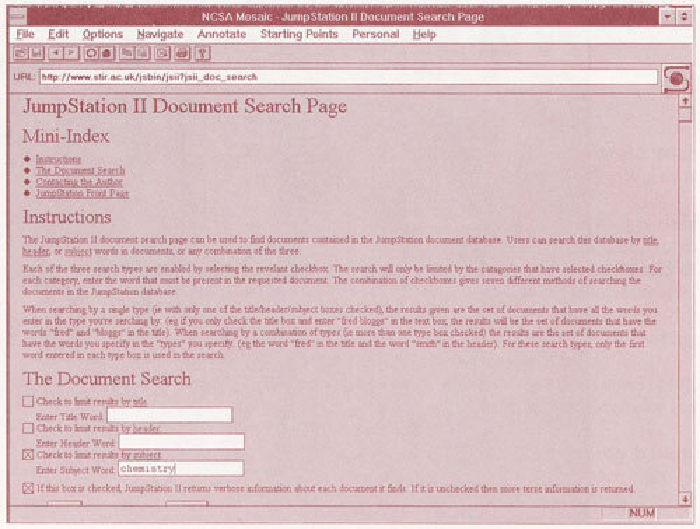8 Search Engines That Rocked Before Google Even Existed
Though the web became publicly available in 1990, the first web search engine didn't arrive until 1993. Up until then, all websites were manually tracked and indexed by people.
And while we now recognize Google as the king of web search, Google wasn't even in the game until 1998. During that five-year gap, a number of other search engines had their chance at glory, and most of them failed. You might even remember some of them.
Here are some of the most famous search engines before Google.
1. WebCrawler

WebCrawler started life in January 1994. Designed by Brian Pinkerton at the University of Washington, it was originally a desktop app. It wasn't until April of the same year that the web version went live.
At launch, it had 4,000 websites in its database and it took just six months for the engine to search for its one-millionth query.
Of all still-surviving search engines, WebCrawler is the oldest search engine that is still active. Today, it aggregates results from Google and Yahoo; it abandoned its own database in 2001.
Of course, it's no longer really a viable Google alternative; there are better options out there.
2. Lycos

Lycos is another old-school search engine that still has a functioning site.
It was born out of Carnegie Mellon University in May 1994 when creator Michael Loren Mauldin turned his university project into a full-fledged company.
Venture capitalists were quick to see the benefits; the site went live with more than $2 million in funding. It's a drop in the ocean when compared to the valuations of tech companies that we see today, but back then it was a phenomenal amount of cash.
Like WebCrawler, Lycos is still going strong. It owns several other nostalgic internet brands, including Angelfire, Tripod, and Gamesville.
3. AltaVista

AltaVista went live in December 1995 and quickly became one of the most popular search engines in the 1990s. Its popularity was down to the search engine's design; it was the first fully searchable, full-text database on the web that had an accessible and easy-to-use interface.
On the day of its launch, the site amassed more than 300,000 visitors. Within two years, it was seeing daily traffic of 80 million.
Famed for its no-frills interface (Google might have been taking notes!), It was the 11th most visited site on the web in both 1998 and 2000. Indeed, at the turn of the millennium, 17 percent of all web users visited the site every week. In comparison, Google was at just seven percent.
In 2003, Overture bought the site for $140 million, with Yahoo subsequently acquiring Overture later in the same year. The site finally went offline in 2013.
4. Excite

Excite is another of the oldest search engines. It was founded in 1994, with the site officially launching the following year. The creators were six students from Stanford University—Graham Spencer, Joe Kraus, Mark VanHaren, Ryan McIntyre, Ben Lutch, and Martin Reinfried.
Excite was one of the first search engines that provided more than just search. When the site went live in 1995, it also offered portals for news and weather, an email service, an instant messaging service, stock quotes, and a fully customizable homepage.
In 1996, Excite purchased WebCrawler and signed exclusive agreements with many of the largest tech companies of today, including Microsoft and Apple.
Excite was famously offered the entire Google business for just $750,000 in 1999 after Sergey Brin and Larry Page decided it was taking up too much of their study time. The then-CEO, George Bell, decided it was too expensive and pulled the plug on the deal. Today, Google is worth $900 billion, making Excite's decision one of the most expensive business mistakes of all time.
5. Yahoo

Yahoo was founded in 1994 with its site going live in 1995. It is the most well-known of all the pre-Google search engines.
Despite several rocky periods, including multiple buyouts, poor visitor numbers, and questionable product decisions, it is still a tech giant.
As of 2021, some of its other services include Yahoo News, Yahoo Mail, Yahoo Finance, and Yahoo Sports, all of which rack up tens of millions of views per day. Like Google, Yahoo also has a litany of failed products in its back catalog, including Yahoo Games, Yahoo Music, Yahoo Messenger, and Yahoo Directory.
According to Alexa, it is still the 11th most-visited site in the world as of 2021.
6. Dogpile

Dogpile went live in November 1996. It has a terrible brand name, but maybe that's what made it memorable.
The creator, Aaron Flin, was frustrated with the lack of consistency in results from other providers, so set about making a metasearch engine. At launch, it pulled queries from Yahoo, Lycos, Excite, WebCrawler, Infoseek, AltaVista, HotBot, WhatUseek, and World Wide Web Worm. It also had the ability to search Usenet, making it one of the most comprehensive search tools on the web at the time. At least it helped you find something new to read.
Today, Dogpile aggregates results from Google, Yahoo, and the Russian search engine, Yandex (which is also older than Google!).
7. Ask Jeeves

Ask Jeeves started in 1996 and immediately found popularity thanks to its unique question-and-answer format. The vision was to create a search engine that allowed users to get answers using natural language as well as keyword searching. While many of us now take that for granted thanks to Google, at the time, it was revolutionary.
Of course, the fact that Ask Jeeves had a memorable mascot in Jeeves the Butler also helped branding. Sadly, Jeeves was eventually phased out in 2006 amid increased competition and declining fortunes.
The site rebranded to Ask.com and went back to a simple question-and-answer format, an approach it still uses to this day.
8. JumpStation

Often considered to be the first "modern search engine," JumpStation went live in December 1993. Hosted at the University of Sterling in Scotland, to an end-user, it behaved and looked like you would expect a search engine to do so.
Under the hood, however, it worked a little differently. The site used document titles and headings to index web pages and did not provide any form of ranking, meaning it could be an arduous task to find the exact result that you were looking for.
These Old Search Engines Will Always Be Remembered
The internet was much different before Google became the king of the world wide web. Although these old search engines tried to make it big, they were eventually forgotten or stamped out by Google's massive growth.
source https://www.makeuseof.com/tag/7-search-engines-that-rocked-before-google-even-existed/
Post a Comment for "8 Search Engines That Rocked Before Google Even Existed"
Comment when there are difficulties